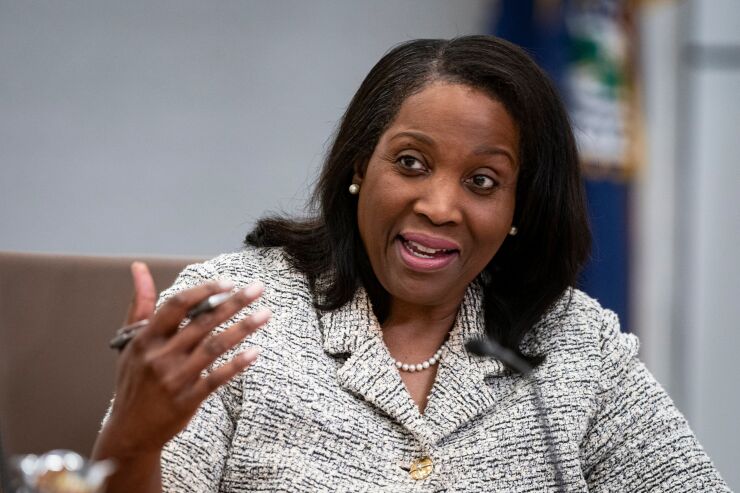
Federal Reserve Gov. Lisa Cook said artificial intelligence could be a transformative, general purpose technology, but that doesn't make a remedy for questionable policy choices.
During a panel discussion at the Federal Reserve Bank of Boston on Wednesday afternoon, Cook said AI will likely have positive effects on both
"The adoption of AI could be disinflationary and it could counter some of the factors that are inflationary, but it may not be able to be relied upon and within a certain given period of time to do so," Cook said. "So, if you're a policymaker and you want to implement some sort of trade policy that might be inflationary, AI productivity gains may not come fast enough to be able to counter those, so we have to be very careful … that's a very relevant risk."
Cook was not addressing any specific policy or policy proposal, but her comments come at a time when AI gains have been a frequent topic of discussion among
Despite its potential use to justify questionable economic statecraft, Cook's attitude toward AI during the discussion was generally positive. During the panel, she reiterated several
She said she has been heartened that broader economic uncertainties that have arisen this year — largely related to sweeping policy changes in Washington — have not curtailed private sector investment into AI technologies.
"A lot of businesses report that they are frozen with respect to investment, especially with longer term projects, but … the businesses, they completely put that aside with respect to AI. Their AI rollout has been going as anticipated at the end of 2024," Cook said. "I find that really, really interesting. And what I hear from AI companies is that we might be able to see the effects, the productivity gains associated with the adoption of AI much sooner, as a result of them just plowing through."
Cook acknowledged that several AI-focused companies have seen their stock values soar to levels well above what their underlying fundamentals would suggest, noting that the Fed's latest financial stability report flags this development as an area of systemic risk, akin to the dotcom bubble of the late 1990s and early 2000s.
"In our financial stability report, our most recent one, we talk about these rich valuations being quite elevated," she said. "So, I am certainly concerned in that sense."
But, she said, she believes the technologies have the ability to deliver on these lofty expectations.
Boston Fed President Susan Collins also participated in the panel, as did Luis Felipe Céspedes, a member of the Board of the Central Bank of Chile. The topic of the discussion was a central banking perspective on the evolving global landscape.
Collins — a voting member on the Federal Open Market Committee this year, alongside Cook — discussed the fact that, despite the broadly recognized uncertainty in the economy, many financial indicators of stress are quite low. She said this dynamic speaks to how complex the current moment is for monetary policymakers, noting that it partially explains why last month's interest rate decision was not unanimous.
"It's all the more reason for us to be sharing a range of views, and we maybe shouldn't be surprised when there's more disagreement about how people are reading things through," Collins said. "It particularly highlights the need to lean into the outlook, because we're trying to create a policy stance for where the economy is going, not where it's been. And so really trying to emphasize why that's so important, I think is even more salient in this context, with different indicators saying elevated uncertainty, but in different ways."
During
Cook said recent data is a reminder for central bankers to be "cautious and humble" in their forecasts and their policies. She pointed to
"These revisions are somewhat typical of turning points, which again, speak to uncertainty," Cook said. "Susan is absolutely right. We want to know not just where we've been, but where we're going, so if we're at an inflection point, we want to look at data that speak to inflection points. And it's not always payrolls. Unemployment rate is still a good indicator of slack in the system, but we have to look at the panoply of them, and we have to keep a close eye on these."






